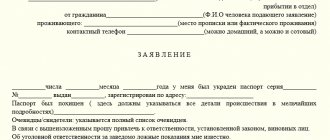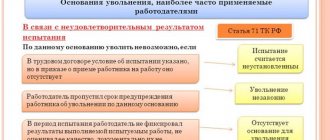Author of the article: Lina Smirnova Last modified: January 2021 21232
The employer's retention of an employee's documents upon dismissal, necessary for his further employment, including a work record book, is illegal. Therefore, a dismissed employee has every right to demand the fulfillment of his rights and hold the employer accountable for wrongful actions, as well as receive material and moral compensation. What actions should he take if the employer does not hand over the work book, we will consider in this article.
Application (appeal to the employer): how to write?
The application is written in free form on a standard A4 sheet. It contains the following information:
- Full name and contact information of the person making the application (employee).
- The requirement to issue the applicant with a work book in person in connection with dismissal.
- Date of application.
- Signature and transcript of the applicant's signature.
If for some reason the employee is unable to appear in person for his work book later, consent to send the document by mail can be attached to the application. The consent must indicate the address to which the work book of the dismissed employee should be sent.
The application or written request should be drawn up in two copies, one of which is handed over to the employer. On the second copy, the employer’s representative puts a note indicating receipt of the application with his signature; the employee keeps this document. If the employer's representative refuses to accept the application or leave a signature on the second copy, the written appeal should be sent to the employer's organization with notification by registered mail.

Of course, if the failure to issue a work book by the employer was the result of an error in the work of the personnel service, a simple written request will be enough to correct the situation. It’s another matter if, by retaining the documents, the employer deliberately prevents the former employee from finding employment. In such a situation, it will not be possible to solve the problem without contacting regulatory authorities or the court. What should an employee do if they intentionally do not issue a work book?
Administrative responsibility of the employer. Fines, sanctions
Failure to comply with an issued order, including violation of the deadlines for issuing or timely execution of a work book, gives the Federal Labor and Employment Inspectorate the right to bring the employer who violated the law to administrative liability. The fine for failure to issue a work book upon dismissal for a legal entity can range from 30 to 50 thousand rubles. An official, that is, a manager, or an individual entrepreneur who fails to issue a work book on time may be punished by disqualification for up to three years or a fine of 1,000 to 5,000 rubles.
But if, despite the inspection of Rostrud and the issued order, the employer does not give the work book, what should the employee do?
Employee actions
When faced with a situation where the employer does not give the dismissed employee a work book, you must:
- Write an application requesting the issuance of a document. It must be sent through official communication channels (through the office, by mail, by courier). The second copy must contain a confirmation of delivery, or there must be an inventory and a receipt confirming that the application was sent by letter. The application must indicate a contact telephone number and the desired method of receipt in person or by mail.
- Appeal to court or labor inspectorate. Both of these authorities can oblige the employer to fulfill its obligations to the former employee.
Labour Inspectorate
This body considers disputes arising in the field of employment. This is where you can contact if the deadline for issuing a work permit has been missed. The peculiarity of the appeal is the possibility of initiating a full audit of the company. If an allegation of violation of labor rights is received, the head of the unit has the right to decide to verify compliance with other legislative norms. A full-scale audit is fraught for the company with the identification of numerous violations and, as a result, large fines.
How to oblige a former employer to issue a work book through the court
How else can you act if they don’t give you your work book? Go to court. There is no need to delay going to court. The statute of limitations for failure to issue a work book and other documents on the day of dismissal is limited to 3 months from the date of termination of the employment contract.
Litigation is the most common and effective way to restore violated rights if the employer does not hand over the work book. What should I do to legally oblige my former boss to hand over a completed work book?
First, the employee must correctly draw up a statement of claim. You can write it yourself or seek legal advice. You will need to provide the following information:
- Information about the plaintiff (applicant).
- Periods of work and position of the applicant, date of dismissal.
- Employer information.
- An offense committed against the applicant, with reference to articles of the Labor Code of the Russian Federation.
- The applicant’s request: issue a work book, make changes to existing records, etc. The statement of claim for non-issuance of a work book also includes demands for moral compensation and compensation for material damage, if any.
- Enclosures: copies of supporting documents.
A copy of the statement of claim is submitted against signature or sent with notification by registered mail to the defendant, that is, the employer.

What to do if the employer does not give the work book - 3 ways to resolve the issue?
Method 1. Attempt to peacefully resolve the problem
Any issue must first be resolved peacefully. If the former employer does not issue a work book, the employee should first submit a written request . For this purpose it is necessary to write an application .
This document must necessarily contain the following information:
- last name, first name, patronymic, position of the head of the organization;
- last name, first name and patronymic of the dismissed person (the position should not be indicated, since the employment contract has already been terminated);
- residential address, as well as contact telephone number of the former employee;
- in the text of the application, the owner of the work book must state a request to issue the document, since the employment contract has been terminated. It should be noted that such actions are a direct violation of the Labor Code of the Russian Federation. Next, you should warn the former employer that if the work record is further retained, the dismissed person will contact the relevant authorities.
- The application must be dated and signed at the end.
The document in question is drawn up in 2 copies. One of them is transferred to the former employer. The second copy remains with the dismissed employee. It is important to ask for a stamp of acceptance and date on
If the employer does not wish to accept the application, it should be sent by registered mail with notification . At the same time, an inventory is drawn up so that in the future, if necessary, it can be proven that this document was sent to the employer.
In most cases, according to all the rules, the transferred application properly affects the former employer. The fact is that an inspection by the relevant authorities can lead to the identification of various kinds of violations. As a result, the dismissed person is given a work book without any problems.
When the application is submitted to the employer, you must wait a certain time. On the one hand, this period is not established by law. On the other hand, the period of time must be reasonable. It makes no sense to contact various authorities 1 - 2 days after sending the application.
Method 2. Contacting the labor inspectorate and prosecutor's office
If the application sent to the employer has no effect, or the dismissed person does not have the desire to draw up one, he can send an appeal to the labor inspectorate or the prosecutor's office . There are several options to do this:
- personal appeal to the inspectorate;
- sending an application electronically on the official website;
- sending by registered mail by Russian post.
In the application, the former employee first of all indicates his full data. In addition to your last name, first name and patronymic, you must write the address of your place of residence.
Next, it is important to describe in detail the events that led to the complaint being filed with the authorities. The application must include:
- full name, as well as the address of the employer’s organization or department in which the employee was employed;
- period of work, as well as date of dismissal;
- the position held by the employee during the period of employment.
If possible, you should attach a copy of the employment contract, as well as the dismissal order, to your application.
The complaint is sent to the prosecutor's office in the same way. However, it should be remembered that the law sets a specific deadline for resolving such issues. According to the Labor Code, the employee must resolve disputes within 3 months from the date of dismissal.
However, this period is established solely for the employee to file a complaint. Even if it has expired, the employer does not have the right to retain the work book of the dismissed person. He is obliged to issue it after a request from a former employee, regardless of how much time has passed since his dismissal.
Method 3. Go to court
At its core, filing a lawsuit is a last resort, which is resorted to when no other actions have helped. However, fired people often use this option when they want to receive compensation . Such payments can only be made by court decision.
To contact the judicial authorities, you must first file a claim . He is sent to the court department, which is located at the place of state registration of the employer.
An important requirement for a lawsuit is the need to clearly indicate the requirements:
- return of a work book held without legal grounds;
- payment of compensation for forced absence;
- payment of moral compensation for the lack of employment opportunities for a new job.
Since in most cases experts recommend trying to resolve the issue peacefully before resolving the issue in court, it is recommended to attach a statement drawn up to the lawsuit.
In addition, if the issue is resolved in the courts, there is another feature. In this case, the dismissal date will be postponed.
In other words, the court will oblige the employer to change the record of employment and dismissal. As a result, the former employee will retain his seniority during the period of forced absence.
Material compensation for the employee
Failure to issue (withhold) a work book at a previous job deprives a citizen of the opportunity to find a new job or apply for temporary support at the Employment Center. Thus, the worker is left without the opportunity to receive unemployment benefits or wages. What to do? They don’t hand over the work book or deliberately delay the issuance of this document? This is primarily a reason to demand compensation through the court for wages for the period when the employee could not find a job due to the fault of the former employer. For each day of forced inactivity, the court will order the employee to pay compensation in the amount of no less than the average earnings in the organization of the former employer.

Length of service and day of dismissal
Another violation of the rights of a dismissed employee concerns the length of service that the employee lost due to the fault of the former employer. By a court decision, the employee is reinstated at work for the entire period when the work book was with the unscrupulous employer. The day of dismissal will be recognized as the day when the employee was actually issued a work book and other documents confirming information about work and length of service. After the court decision comes into force, the employer is obliged to:
- Issue an order to reinstate the dismissed employee at work in the position he held at the time of dismissal.
- Make an entry in the work book of the reinstated employee to invalidate the previously made entry on termination of the employment contract with the employee.
- Issue a new dismissal order, dated on the day the work book was issued.
- Make an appropriate entry in the work book.
Important! Reinstatement does not entail the employee’s obligation to work for this period.
FAQ
When carrying out labor activities, an employment contract was not drawn up. Is it possible to recover compensation from a manager upon dismissal?
- Possible only through court. But it is necessary to provide evidence of work activity at the enterprise: testimony of witnesses, certificates of salary receipt, payslips, video recordings, audio recordings, actual use of the enterprise’s e-mail and others.
What is the best way to proceed if the employer does not issue a salary notice upon dismissal: contact all types of authorities at the same time or in a certain order?
- Appeals to authorities are carried out in stages: if the enterprise has a labor dispute committee, you first need to contact them; The next step is to contact the labor inspectorate and, at the same time, to the prosecutor's office, then to the court. If the employee first filed an application with the judicial authorities, he will no longer be able to contact the labor inspectorate.
What are the terms for settlement between an employer and a resigned employee?
- All payments are made on the employee's last working day.
But there are exceptions to the rule:
- the employee’s absence from work on the day of dismissal (for example, he is on sick leave), and the salary is paid in cash, then the payment is made the next day after the request for payment;
- the employee is given leave before dismissal, then vacation pay is paid three days before the starting date, the remaining amount is paid on the last working day;
- the employee has died, then the payment is issued to the family member who provided documents confirming the fact of relationship within a week;
- the day of dismissal coincides with a day off, then the calculation is made on the working day following the day off.
Circumstances and measures excluding the employer's liability
But is the law always on the employee’s side? Failure to issue a work book on the day of dismissal does not entail liability for the employer if the head (representative) of the organization did not have the opportunity to hand over the document to the employee in a timely manner, but he took all the necessary measures.
Perhaps the most common situation when an employer does not hand over a work book through no fault of his own is the absence of the dismissed employee on the last day of work or shift (day of dismissal). The reasons for this may be absenteeism, temporary disability, vacation followed by dismissal and other circumstances. The employer can take the following measures:
- Draw up an act confirming the absence of the dismissed employee from the workplace on that day and enter the corresponding mark in the working time sheet.
- Send a letter to the employee in a timely manner with an official notification of the need to appear in person to receive a work book. As a rule, such a document is sent by registered mail to the employee’s place of registration (registration), as well as to all the employee’s addresses that are known to the employer. From the date of dispatch, the employer is relieved of responsibility for late issuance of the document.
In a situation where the failure to issue a work book upon dismissal occurred due to a refusal to receive the document, the employer, in accordance with the law, must act as follows:
- On the day of dismissal, an act is drawn up about the citizen’s refusal to receive a work book. The employee must be familiarized with the act by signature.
- Ensure the storage of an unclaimed work book until it is handed over to the employee in person or for 75 years from the date of dismissal.

The boss is obligated to give the work book to the dismissed employee. Violation of labor rights
Legal relations that arise in this area are regulated by the Labor Code of the Russian Federation (hereinafter referred to as the Labor Code of the Russian Federation).
Article 84.1 regulates the employer’s obligation to return the work book of an employee who resigns: The return must occur on the last day, which, based on the application for dismissal or other reasons, is considered a working day.
The legislation of the Russian Federation identifies several cases in which the employer has the opportunity not to issue a document to the employee and not be punished:
- On the day when it is planned to terminate the employment contract, the employee is absent from the organization.
- The employee himself refuses to pick up the book.
In this case, the boss needs to send a notice to the employee that he must pick up all his documents. If after this he does not appear, then the papers are sent by registered mail.
According to the law, the organization issues a document on the last working day or within three days after receiving an application from a resigning citizen.
Where can I restore my employment?
But there are also very difficult cases. For example, the employer does not hand over the work book, and the organization in which the employee worked ceases to exist, that is, is liquidated. Difficulties arise if it is impossible to establish the whereabouts of the former manager. Over time, it may be possible to find the unscrupulous employer and return the lost document. But in order to be hired for a new job or calculate work experience, the employee will need to draw up and receive a duplicate of the work book. How to confirm existing experience and who has the right to issue a duplicate document?
First of all, the employee will have to obtain documents confirming his existing experience, continuous and general. Such documents may be:
- Certificates from the Social Insurance Fund and the Pension Fund branch confirming the availability of social contributions and pension contributions during these periods.
- Certificates, copies of personnel administrative documents (orders) from previous places of work, including information from archival organizations.
Based on supporting documents, information about the employee’s past work activity is entered into the duplicate. Who has the right to issue such a duplicate? According to the currently existing Rules, the employee must apply for a duplicate at his last place of work. But what to do when it is the last employer who is to blame for the loss of his employee’s documents, and it is not possible to find him?
If an employee plans to find a new job, then the new employer has the right to draw up and issue a new work book and indicate information about the length of service based on supporting documents. In the new work book, issued to replace the lost one, the total length of previous work experience is entered in total, but without specifying the periods of work, indicating the positions of the employee and previous employers.










